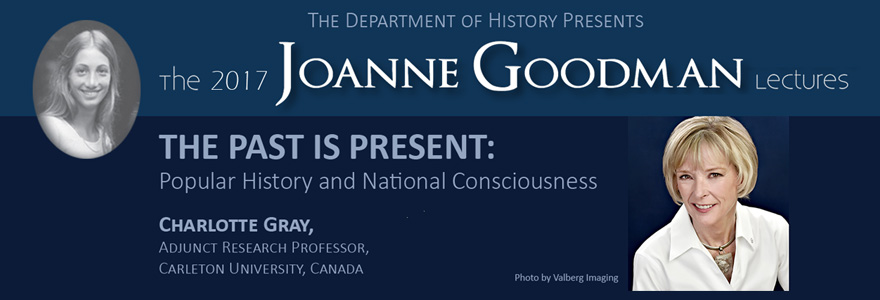News and Updates
Contact
Faculty of Social Science
Social Science Centre
Room 9438
Western University
T. 519-661-2053
F. 519-661-3868
E. social-science@uwo.ca
Goodman Lectures to examine popular history and national consciousness
September 18, 2017
As Canada celebrates it sesquicentennial, the Department of History is hosting a lecture series focused on how people understand and interact with Canadian history.
The 2017 Goodman Lectures will be delivered by Charlotte Gray and will discuss the importance of popular history, and the inter-relationship between popular and academic history. Gray, a Canadian historian, has been called one of Canada's best-loved writers of popular history and literary biography.
“Popular history,” said Gray “is important in giving a non-academic audiences a sense of Canada’s past. It’s important for citizens to know – and enjoy knowing – how this country evolved. History helps us all understand today’s Canada better.”
Gray said that Canada is a country without a strong narrative.
“Every generation redefines this country,” said Gray. “The demographic churn is incredible. I arrived (from Britain) 40 years ago, and at the time, immigration was primarily from Europe. Now most immigration is from China, India and the Philippines, and the country (Canada) is changing very rapidly. The story has to keep pace with that change.”
Along with the changing face of Canada, historians face the ongoing challenge of keeping people interested in Canadian history.
“Finding subjects that the general public will enjoy and presenting them in a way to make them accessible is about good writing and good film making,” said Gray. “It’s about presenting stories with flair.”
Gray said that she has used her work, such as The Massey Murder – about a notorious crime that occurred in the Toronto in the early 20th century – to bring readers back into that period, and tell a bigger story about Canada. But her work, she said, is dependent on the work of academics.
“Popular history cold not exist without the work of academics, and academics would lose much of their audience without popular history,” said Gray.
Gray’s first lecture, entitled “Selling History: Education or Entertainment?” will look at this balance between the two approaches to history.
The second “Putting History on the Screen”, looks at what it is it that screenwriters need if they are treating history on screen, in order to recruit an audience, with special consideration of the Canadian Heritage Minutes, Canada, A People’s History and Canada, The Story of Us.
The final lecture in the series, “Canada’s Sesquicentennial: The post-national celebration” will examine how Canada celebrates its past, in light of the constant demographic change, which has made Canada, as Prime Minister Justin Trudeau labelled it “A Post-National Country”. In particular, Gray will examine the ways Canada has celebrated Dominion Day and Canada Day, since 1867, and how she tries to engage readers in the past in her books.
The Joanne Goodman lectures were established in 1975 by the Honourable Edwin A. Goodman and his family of Toronto to perpetuate the memory of their beloved elder daughter, a second year History student who died in a highway accident in April of that year. Since 1976 the series has been jointly sponsored by the Department of History and the University Students' Council.
The lectures are widely recognized as being the most important history lecture series in Canada. The invitation to deliver them and the publications that result are highly regarded in this country and around the world.
The 2017 Joanne Goodman Lectures will take place September 26, 27, and 28, in the Great Hall on Western University campus.

